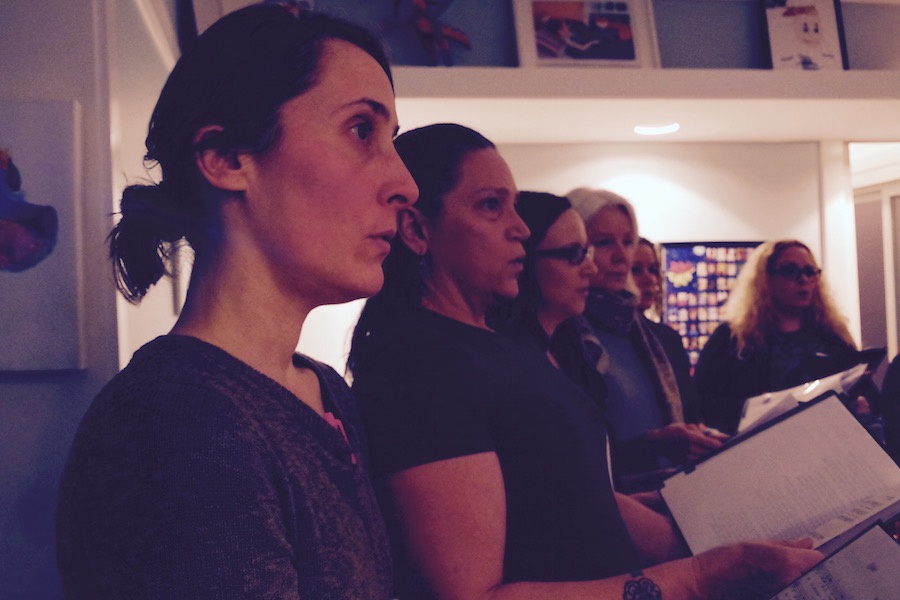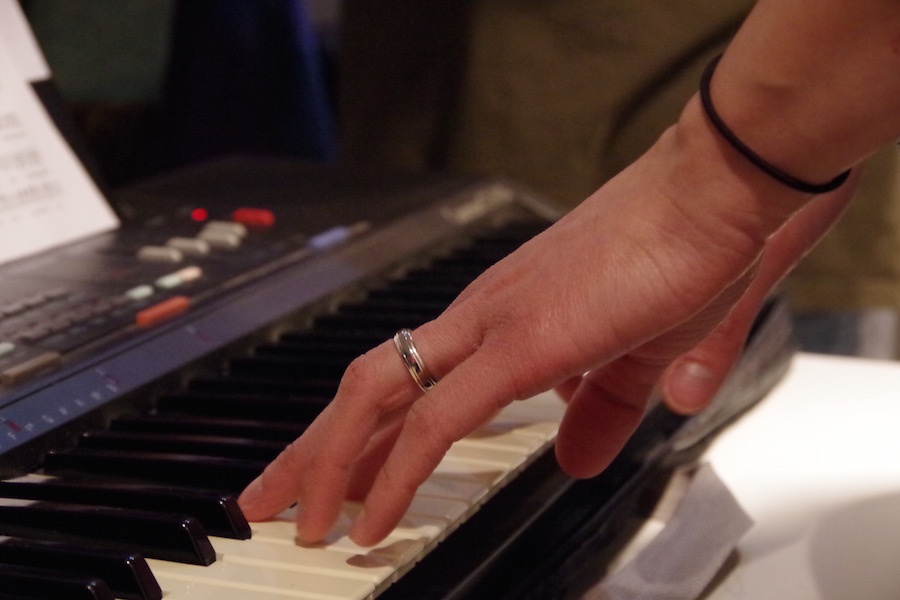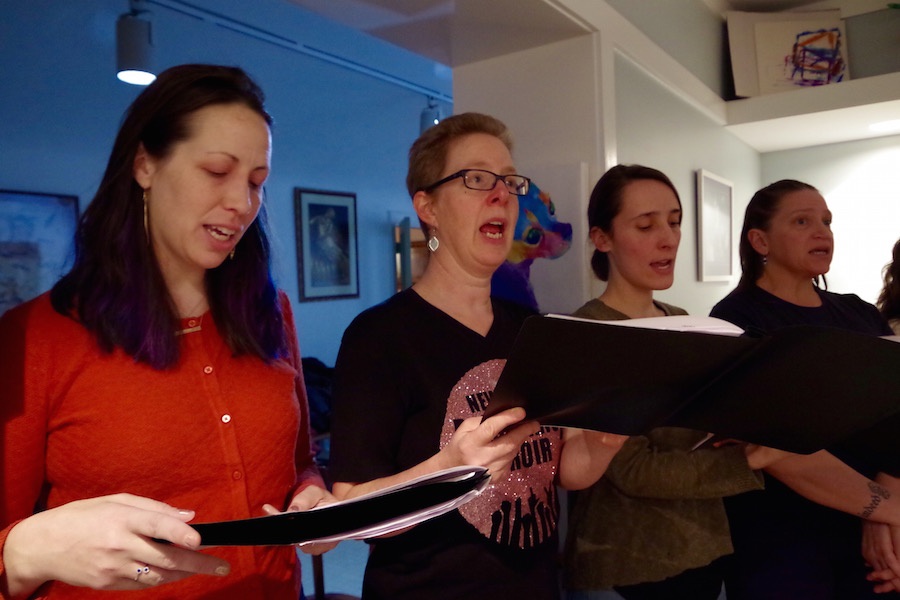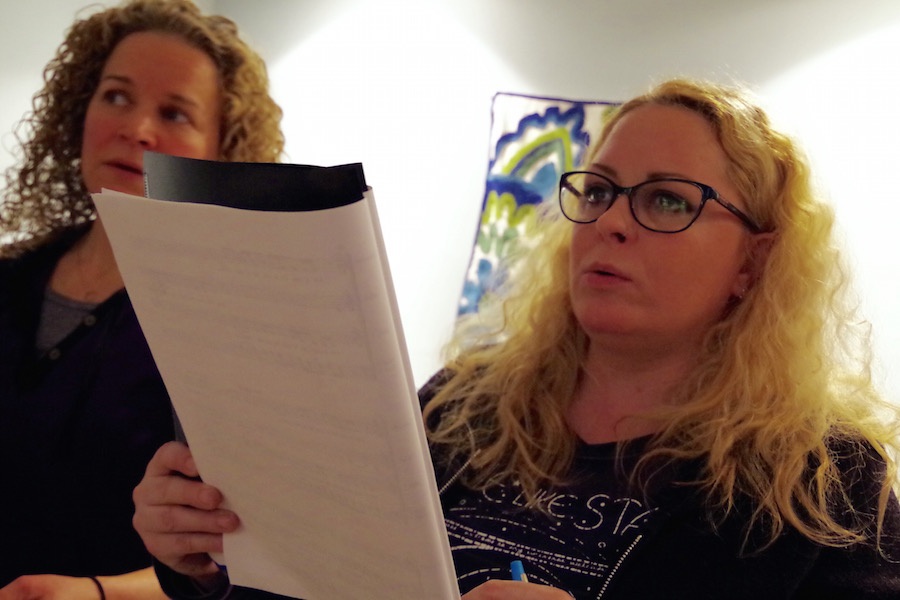
Artist Ana Henriques, with members Shirley Louise-May, Catherine Bailey, and Ann Wiley in the background. Lucy Gellman Photo.
Fourteen pairs of feet surrounded Laurie Sweet’s carpet in a half-moon, pedaling to a human beatbox near the back of the room. A few pages of sheet music rustled. At a keyboard, Jennifer Sciglibaglio lifted her hands, fingers outstretched. Every eye followed them as they dipped down, and then forward. The room exploded in sound.
I can’t keep quiet/No-oh-oh-oh-oh-no, coasted over the carpet, flowing onto the hallway outside. I can’t keep quiet/No-oh-oh-oh-oh-no/A one woman riot/Oh-oh-oh-oh-oh-oh/For anyone/Nooooo/Not anymore.
It was the scene—and the sound—Wednesday night at Sweet’s home, as the New Haven Resistance Choir stepped into formation for a special weekly rehearsal. This Saturday, the all-volunteer group will be singing MILCK’s viral song “I Can’t Keep Quiet” at the Women's March in Hartford.
The occasion marks the one-year anniversary of the Women’s March, which drew millions of women across the country and globe a day after President Donald Trump’s inauguration. It was on that day in Washington, D.C. that MILCK first performed “Quiet” with her own resistance choir, inspiring nationwide a cappella performances of the song and a storytelling-based website called #ICantKeepQuiet.

Sciglibaglio took Wednesday to slow down and work with each part of the harmony before Saturday. Lucy Gellman Photo.
But the song is only one of the starting points for the choir. Almost exactly a year ago, Sweet began thinking about how to resist politically as she tried to grapple with a new administration that she hadn’t seen coming. On election day in 2016, she’d taken her two young kids with her to the polls in New Haven, wearing her grandmother’s antique watch as a good-luck charm. She said she’d felt a surge of pride as she explained to them that she was voting for the Democratic Party’s first female presidential nominee.
Then she hadn’t thought too much about the outcome—until she was at a friend’s house that night, watching the results roll in. “A friend of mine kept saying, ‘Let’s just wait for the next state, and then the next state, and then it [the election’s final result] happened,’” she recalled.
“I was complacent,” she said. “I just kept thinking: What am I going to tell my kids?”
The answer, she decided, was in her own resistance. In January 2017, Sweet learned about Nasty Women New Haven, ultimately editing the catalogur for the group’s first exhibition that March. In February, she sent out a call via social media—would anyone be willing to form a “resistance” choir with her? Singers didn’t need to be good. They just needed to show up.

Laurie Sweet, with Gwen Petti, Ana Henriques andShirley Louise-May. Petti and others spent part of the evening ironing glittery pink and purple logos onto black t-shirts that they'll wear Saturday. Lucy Gellman Photo.
Friends from Music Together, Neighborhood Music School, and Silk n’ Sounds Chorus jumped in to help. The rest, Sweet said, came by word of mouth. After a first “flash mob” performance of “Quiet” at the closing reception of Nasty Women New Haven, the group has performed at the Nasty Women Film Festival and Ely Center for Contemporary Art.
“The idea is that this is our own peaceful way of protest,” she said. “They’re accessible songs. Anybody who wants to come is welcome to come.”
That spirit sprang to life Wednesday night, as a steady trickle of women (there are also two men in the choir, one of whom came out for rehearsal) came through Sweet’s front door. They are a varied group: midwives, semi-retired nurses and prenatal massage therapists, art history professors, art teachers, IT gurus, full-time moms, medical writers, shaker-toting state troubadours and artists stripped of their work Visas. The professional vocalists among them are few and far between, a fact with which Sweet said she’s just fine. She added that they're always looking for more members, and hoping to broaden the group's diversity.
"We realize we are a very white group," she said, noting that she has friends who are afraid to join because of their immigration status. "If anyone has suggestions, I am open. If folks can make the rehearsal time and want to sing, they are in. There are no other requirements."
After a cacophony of unzipped boots, rustling polyester and down jackets, and mass un-scarfing, the group formed an open circle in a back room, all eyes on Sciglibaglio as she prepared to conduct. Sweet’s chihuahua Rosa scampered cautiously across the carpet, a bright, geometric pattern with grape juice stains and a few well-worn feet marks. Sweet found a spot close to the piano, her eyes doing a quick check of the rest of the group.

Sarah Sartarelli: With the group since its beginning. Lara Herscovitch, pictured in the background, was singing with the group for the first time. Lucy Gellman Photo.
The path of air in the room shifted. Laughter died down. Sciglibaglio raised her hands. Oooooooooooooo, the group began.
Put on your face
Know your place
Shut up an smile
Don’t spread your legs
Oooooooooooh. Iiiii could do that.
On one side of the room, former State Troubadour Lara Herscovitch turned into the percussion section, juggling a shaker as she beatboxed through her teeth. Cymbals stuttered and crashed on cue somewhere behind her tongue.
But no one knows me
No one ever will
If I don’t say somethin'
If I just lie still
A few vocal parts tried reaching for higher notes on the pages before them. Sciglibaglio pushed her whole body into the song, arms driving forward with the force of each word. Her arms cut through the air around her, their electricity catching on around the room.
Would I be that monster/Scare them all away
If I let them hear what I have to say?
The group prepared to split into even more parts, Herscovitch stomping her foot as member Shirley Louise-May, a medical writer by day, let out an Aaaaaaaauuuaaahhhh at the top of her register.
There'll be someone who understands/Let it out let it out nooooooww
Must be someone who understands/Let it out let it out nooooooww
Sciglibaglio guided them through the end of the song, cross-checking the mental notes she’d made against the score. As singers broke out into groups and practiced their parts, a few members of the resistance choir huddled in to catch up with each other.
“However people are comfortable standing up and speaking out, the more the better,” said Kristin Wiley, a midwife at Women’s Health Associates in New Haven’s Hill neighborhood. Both she and her mom, Ann, have been with the group since its flash mob last year.
“Some people can stand up and speak. Some people can stand up and sing.”
To listen to the choir rehearse, click on the audio above.